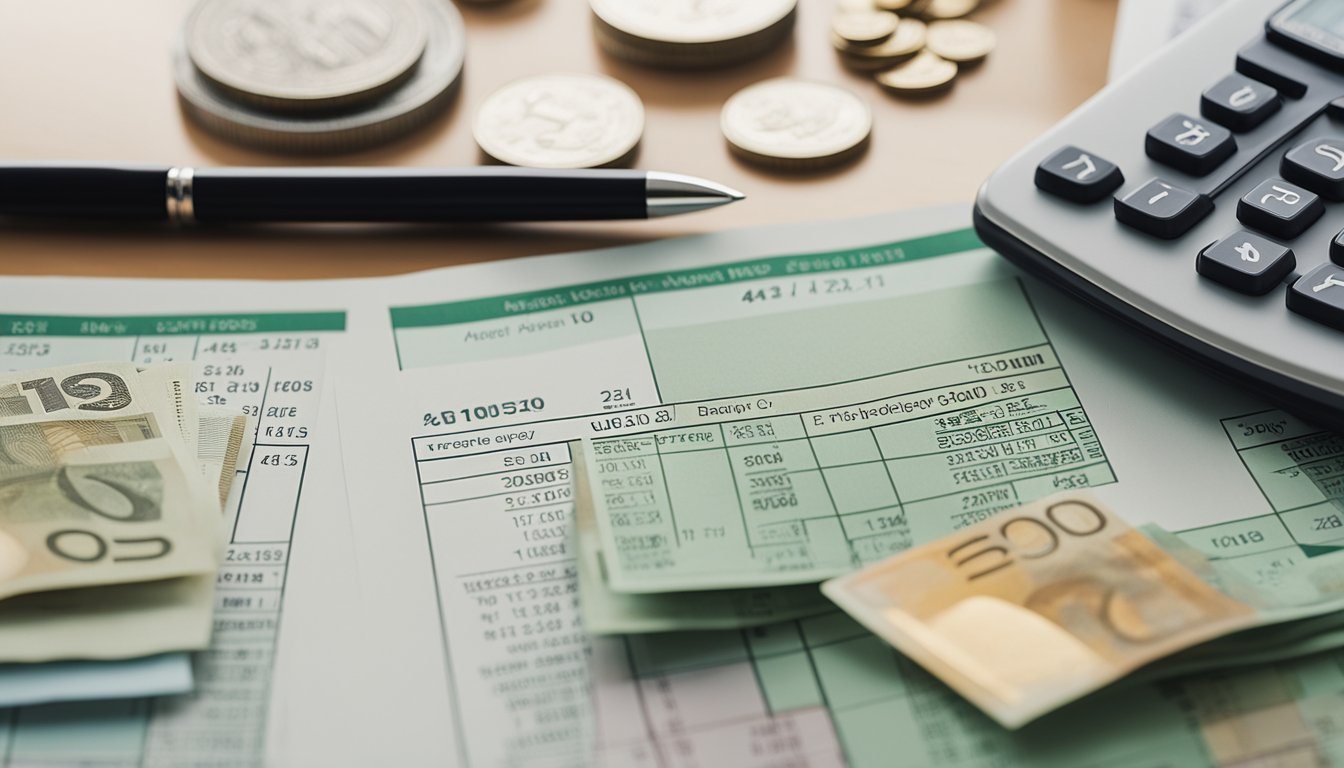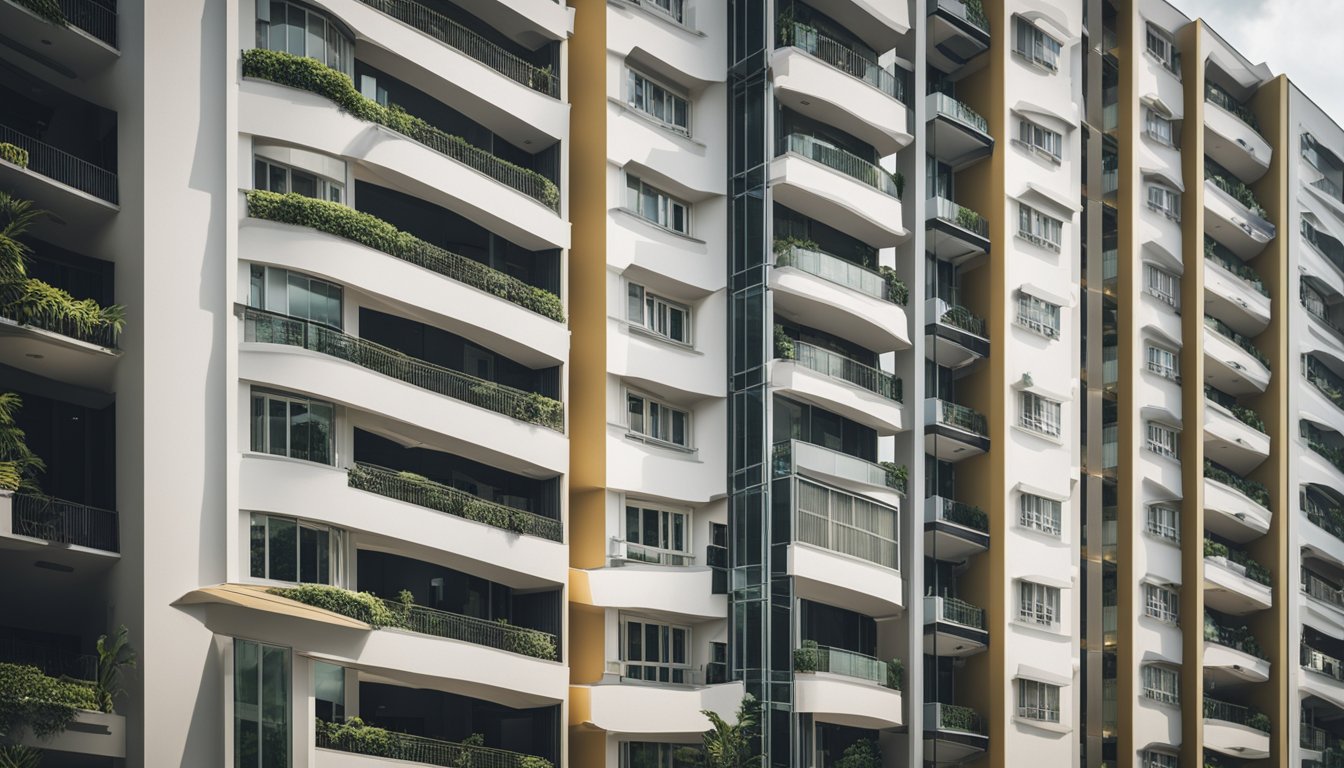If you’re in the market for a condo in Singapore, one of the first things you need to know is the minimum deposit required. The minimum deposit, also known as the downpayment, is a percentage of the total purchase price that you must pay upfront. This amount can vary depending on several factors, including the type of property you’re buying, your eligibility, and the loan-to-value (LTV) ratio.

Understanding the minimum deposit for a condo in Singapore is crucial because it can impact your financial planning. While it’s tempting to focus on the monthly instalments, the downpayment is a significant upfront cost that you should prepare for. In this article, we’ll explore the financial aspects of buying a condo, including the minimum cash downpayment required, eligibility and limitations for buyers, and practical steps to acquiring a condo.
Key Takeaways
- The minimum deposit for a condo in Singapore is a percentage of the total purchase price that you must pay upfront.
- The amount of the minimum deposit can vary depending on several factors, including the type of property you’re buying, your eligibility, and the loan-to-value (LTV) ratio.
- Understanding the financial aspects of buying a condo, including the minimum cash downpayment required, eligibility and limitations for buyers, and practical steps to acquiring a condo, is crucial for successful condo ownership.
Understanding Condo Downpayments in Singapore

If you’re planning to buy a condo in Singapore, one of the first things you should know is the minimum deposit required. The minimum deposit is also called a downpayment, and it’s the amount you need to pay upfront to secure the property. In this section, we’ll explain what you need to know about condo downpayments in Singapore.
Loan-to-Value (LTV) Limit
The Loan-to-Value (LTV) limit is the maximum amount you can borrow from a bank to finance the purchase of a property. The LTV limit for condos in Singapore is 75%. This means that you can borrow up to 75% of the purchase price of the condo. The remaining 25% of the purchase price must be paid in cash or from your CPF account.
Minimum Cash Downpayment Requirements
The minimum cash downpayment requirement for condos in Singapore is 5% of the purchase price. This means that if you’re buying a condo that costs S$1 million, you’ll need to pay a minimum of S$50,000 in cash. The remaining amount can be paid using your CPF account.
It’s important to note that the minimum cash downpayment requirement may vary depending on your citizenship status and the number of properties you own. For example, if you’re a Singaporean citizen buying your first property, you may not need to pay any cash downpayment. On the other hand, if you’re a foreigner buying a second property, you may need to pay a higher cash downpayment.
In conclusion, understanding condo downpayments in Singapore is crucial if you’re planning to buy a property. The LTV limit and the minimum cash downpayment requirement are important factors to consider when calculating how much you need to pay upfront. Make sure you have enough cash or CPF savings to cover the downpayment before you start your property search.
Financial Aspects of Buying a Condo

When you’re buying a condo in Singapore, there are several financial aspects that you need to consider. In this section, we’ll discuss some of the key financial considerations that you should keep in mind when purchasing a condo.
Stamp Duty and Additional Costs
One of the most significant costs associated with buying a condo in Singapore is stamp duty. This is a tax that is imposed on the purchase of property, and the amount you’ll need to pay will depend on the purchase price of the condo. You can use a stamp duty calculator to estimate the amount of stamp duty you’ll need to pay.
In addition to stamp duty, there are other costs associated with buying a condo, such as legal fees, valuation fees, and agent fees. These costs can add up quickly, so it’s important to budget for them when you’re planning your purchase.
CPF Usage for Downpayment
If you’re a Singaporean citizen or permanent resident, you can use your CPF savings to pay for the downpayment on your condo. The amount you can use will depend on your age and the value of the property. However, it’s important to note that there are limits to the amount of CPF savings you can use, and you’ll need to have enough funds in your CPF account to cover the downpayment.
Loan Options and Interest Rates
When it comes to financing your condo purchase, you have several options. You can take out a bank loan, an HDB loan, or a loan from a financial institution. Each option has its own advantages and disadvantages, so it’s important to do your research and choose the one that’s right for you.
When you’re comparing loan options, it’s important to pay attention to the interest rates. Floating interest rates can be attractive because they’re typically lower than fixed interest rates, but they can also fluctuate over time. Fixed interest rates, on the other hand, provide more stability but may be higher than floating rates.
In conclusion, when you’re buying a condo in Singapore, it’s important to carefully consider the financial aspects of your purchase. By budgeting for stamp duty and additional costs, understanding your CPF usage options, and comparing loan options and interest rates, you can make a well-informed decision that meets your needs and budget.
Eligibility and Limitations for Buyers

Are you planning to buy a condo in Singapore? Before you start looking for the perfect unit, it is important to know the eligibility and limitations for buyers. Here are some key factors to consider:
First-Time Home Buyer Advantages
If you are a first-time home buyer, you may be eligible for certain advantages such as housing grants and priority allocation of flats. The Enhanced Housing Grant (EHG) is available for first-time buyers of new or resale flats, including Executive Condominiums (ECs). The grant amount varies depending on your income and the type of flat you are buying. You can use the grant to offset the purchase price of the flat or to reduce the mortgage loan amount.
Foreign Buyer Regulations
If you are a foreigner looking to buy a condo in Singapore, there are certain regulations you need to be aware of. Foreigners are not allowed to buy landed properties, and are subject to additional buyer’s stamp duty (ABSD) when buying any residential property. The ABSD rates vary depending on your residency status, and can range from 5% to 20% of the purchase price.
Income Ceiling and Loan Eligibility
Your income ceiling and loan eligibility are important factors to consider when buying a condo in Singapore. The income ceiling is the maximum amount of income you can earn to be eligible for certain housing grants and schemes. For example, the EHG has an income ceiling of $9,000 per month.
Your loan eligibility is determined by your total debt servicing ratio (TDSR), which is the percentage of your income that goes towards debt repayment. The TDSR limit is 60% for most borrowers, and 50% for those who own more than one property.
To ensure that you are eligible for a condo purchase, it is important to calculate your income and debt obligations carefully. You can use online calculators or consult with a financial advisor to determine your loan eligibility and affordability.
Overall, buying a condo in Singapore can be a great investment for Singapore citizens, permanent residents (PRs), and foreigners alike. However, it is important to consider the eligibility and limitations for buyers before making a purchase. By doing so, you can ensure that you are making a wise and informed decision that meets your financial goals and needs.
Practical Steps to Acquiring a Condo

Looking to acquire a condo in Singapore? Congratulations! It’s an exciting time, but it can also be overwhelming. Here are some practical steps to help you navigate the process:
Calculating Upfront Costs
Before you start looking at condos, it’s important to calculate the upfront costs. This includes the down payment, legal fees, stamp duty, and other expenses. The minimum deposit for a condo in Singapore is usually 5% to 10% of the purchase price. However, keep in mind that the more you can put down, the lower your monthly instalments will be.
Managing Outstanding Loans and Monthly Instalments
If you’re taking out a loan to purchase a condo, it’s important to manage your outstanding loans and monthly instalments. Make sure you have a good credit score and a stable income. You can use your CPF Ordinary Account to pay for the down payment, monthly instalments, and other housing-related expenses.
Selecting Between BTO and Resale Flats
When it comes to selecting between BTO and resale flats, it’s important to consider your budget, location preferences, and timeline. BTO flats are generally cheaper, but you’ll have to wait a few years before you can move in. Resale flats are more expensive, but you can move in right away.
Overall, acquiring a condo in Singapore requires careful planning and consideration. By calculating upfront costs, managing outstanding loans and monthly instalments, and selecting between BTO and resale flats, you can make the process smoother and more manageable.
Frequently Asked Questions

How exhilarating is it to discover the required salary to purchase a condo in Singapore?
Discovering the required salary to purchase a condo in Singapore can be an exhilarating experience. It’s important to know that the minimum salary required to purchase a condo in Singapore depends on various factors, such as the size of the condo, its location, and the loan tenure. You can use a condo affordability calculator to get an estimate of the salary you need to purchase a condo in Singapore.
What’s the thrill in using a condo down payment calculator in Singapore?
Using a condo down payment calculator in Singapore can be thrilling because it helps you to determine the down payment you need to pay when purchasing a condo. The down payment required for a condo in Singapore is usually 25% of the purchase price, and at least 5% must be paid in cash. You can use a condo down payment calculator to find out how much cash and CPF you need to pay for the down payment.
Can you feel the buzz when calculating the down payment needed for a condo in 2023?
Calculating the down payment needed for a condo in 2023 can be a thrilling experience. The down payment required for a condo in Singapore is usually 25% of the purchase price, and at least 5% must be paid in cash. If you are planning to purchase a condo in 2023, you can use a condo down payment calculator to find out how much cash and CPF you need to pay for the down payment.
Isn’t it thrilling to find out if CPF can be utilised for a condo down payment?
Yes, it is thrilling to find out if CPF can be utilised for a condo down payment. CPF can be used to pay for the down payment of a condo in Singapore, but there are certain limits and conditions that must be met. For example, the CPF Ordinary Account can be used to pay for the down payment up to 15% of the purchase price, while the CPF Special Account can be used to pay for the down payment up to 10% of the purchase price.
What’s the excitement around the total cost of acquiring a condo in Singapore?
The excitement around the total cost of acquiring a condo in Singapore is because it involves a significant investment. Apart from the down payment, there are other costs involved in acquiring a condo, such as stamp duty, legal fees, and valuation fees. You can use a condo affordability calculator to get an estimate of the total cost of acquiring a condo in Singapore.
How stimulating is the possibility of buying a condo with no down payment?
The possibility of buying a condo with no down payment can be stimulating, but it is not a common practice in Singapore. Most banks and financial institutions require a down payment of at least 5% of the purchase price to qualify for a home loan. However, there are some schemes and options available that can help you to reduce the down payment, such as the Deferred Payment Scheme and the Step-Up CPF Housing Grant.

